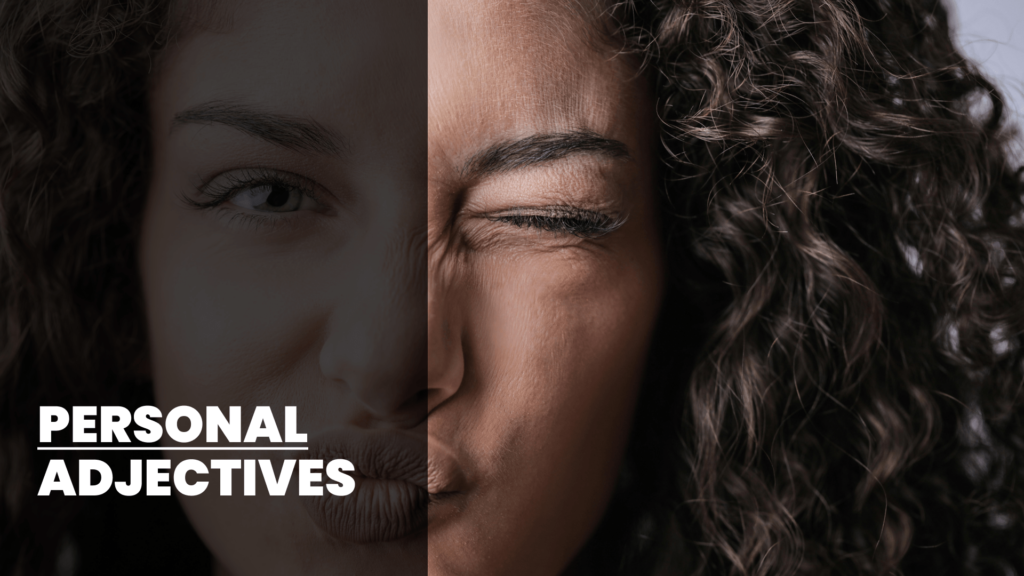
Want to learn Spanish? Try Mondly for FREE now!
If you’re just starting to learn Spanish, basic Spanish words are a great place to begin. At the A1 level, one of the most useful things is knowing how to describe yourself and others—language you’ll use all the time. Today, let’s talk about personal adjectives (adjetivos personales)—simple words that show what someone is like.
No complicated grammar, just the basics to get you speaking.
As a Spanish learner myself, I’ve learned the hard way that aiming for fluency right away isn’t the best goal when learning a new language. So, if you’re just starting out with Spanish, I highly recommend familiarizing yourself with the CEFR (Common European Framework of Reference). It will guide you on what to focus on at each stage of your learning journey. Check out this article to get a clearer idea of what you should learn as a beginner and what’s expected of you along the way.
Basic Spanish Words: Personal Adjectives in Spanish
- Adjetivos (ahd-heh-TEE-bohs) — Adjectives
- Personales (pehr-soh-NAH-les) — Personal
Here’s a list of basic personal adjectives in Spanish. These are A1-level words, so they’re perfect for beginners. I’ve added the pronunciation guide to help you feel confident saying them out loud.
- Alto (AHL-toh) — Tall
- Bajo (BAH-hoh) — Short
- Guapo (GWAH-poh) — Handsome
- Bonita (boh-NEE-tah) — Pretty
- Simpático (seem-PAH-tee-koh) — Friendly
- Antipático (ahn-tee-PAH-tee-koh) — Unfriendly
- Inteligente (een-teh-lee-HEN-teh) — Intelligent
- Tímido (TEE-mee-doh) — Shy
- Extrovertido (ehks-troh-vehr-TEE-doh) — Outgoing
- Trabajador (trah-bah-hah-DOR) — Hardworking
- Perezoso (peh-reh-SOH-soh) — Lazy
- Fuerte (FWER-teh) — Strong
- Débil (DEH-beel) — Weak
Using Personal Adjectives in Sentences
The easiest way to use these adjectives is with the verb ser (to be). Here are some simple examples you can start using right now:
- Soy inteligente. — I am intelligent.
- Mi amigo es simpático. — My friend is friendly.
- Ella es bonita. — She is pretty.
- Él es trabajador. — He is hardworking.
Notice how the adjectives match the gender of the person you’re describing. Words ending in -o are usually for masculine nouns (like trabajador), and -a for feminine nouns (like bonita). Some adjectives, like inteligente or débil, don’t change—they work for both masculine and feminine nouns.
A Quick Tip About Agreement
In Spanish, adjectives need to agree with both the gender and the number of the noun. If you’re describing more than one person, you add an -s at the end:
- Ellos son altos. — They are tall. (for a group of men or mixed group)
- Ellas son bonitas. — They are pretty. (for a group of women)
It might take a bit of practice, but once you start using these phrases in real conversations, it’ll feel more natural.
Try Mondly for Free Now!
Want to improve your Spanish as a beginner? I personally recommend Mondly, as it helped me tremendously when I was just starting out. With its interactive lessons and real-world conversations, it’s an excellent tool for expanding your vocabulary and building confidence in Spanish. Try Mondly now for free!
Practice Time: Describe Yourself
Now, let’s put this into action! Try writing a few sentences about yourself using these adjectives. For example:
- Soy extrovertido y trabajador. — I am outgoing and hardworking.
- Soy tímida pero inteligente. — I am shy but intelligent.
If you want, mix and match adjectives to create full descriptions of yourself or your friends. The more you practice, the easier it gets.
Final Thoughts: Learning Spanish for Beginners
Don’t stress about being perfect. The goal is to communicate and connect with others. Even if you make a mistake, most people will appreciate your effort.
So, what about you? ¿Cómo eres? (What are you like?) Start with these basic Spanish words, keep practicing, and little by little, you’ll build the confidence to describe yourself and the people around you in Spanish.
Happy studying!


